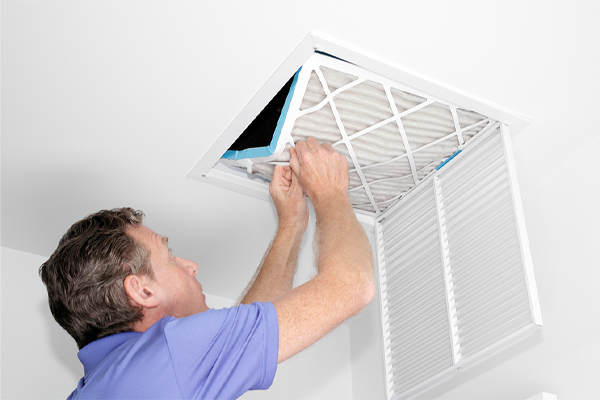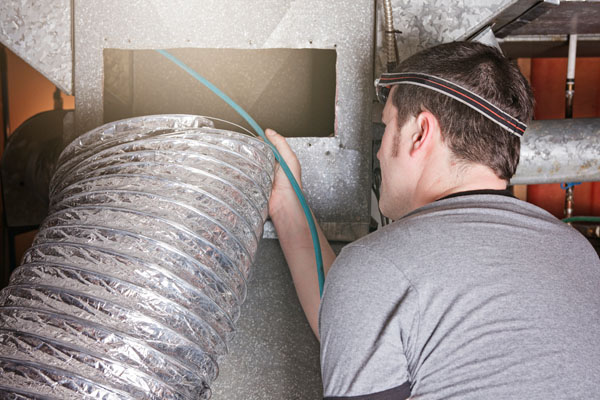How To Improve Your Home’s Indoor Air Quality With These Simple Tips
 Air pollution is typically associated with dirty factories, car exhaust, and other factors that create poor outdoor air quality. Many fail to realize that pollution can occur indoors, as well.
Air pollution is typically associated with dirty factories, car exhaust, and other factors that create poor outdoor air quality. Many fail to realize that pollution can occur indoors, as well.
This deserves attention as the average person spends most of their time indoors. Fortunately, there are many ways to improve indoor air quality to ensure the health of your loved ones. In this article, we’ll discuss what defines indoor air quality, the causes of indoor air pollution, and how to improve indoor air quality in your home.
What Is Indoor Air Quality?
Contents
Indoor air quality refers to the condition of the air we breathe while inside a closed structure. Air quality can affect people’s health and wellbeing. It can influence mood and comfort. What’s alarming is that studies have shown a much greater amount of contamination indoors than outdoors. Researchers point the finger at current building construction practices.
We tend to build more airtight spaces to chase higher energy efficiency. While we can reduce energy consumption, we lose out on fresh air from natural ventilation. Irritants in the air get trapped inside the home and build up to dangerous levels over time. Ducts recirculate dirt, dust, and dander at an ever-increasing amount.
Causes Of Poor Indoor Air Quality
The problem can be traced to a variety of things that relate to the way we live. For example, a lot of households have pets for companionship, security, and other benefits. Yet, they also generate a large amount of fur and dander that could trigger allergies. Paint-covered walls may release volatile organic compounds. Dirt and dust can make their way inside through footwear and the HVAC system. Mold and mildew may develop due to persistent moisture. Household chemicals can also add to indoor air quality issues.
The Effects Of Poor Indoor Air Quality
 Homeowners should pay attention, or they might suffer the consequences of poor indoor air quality. Family members may start exhibiting symptoms of respiratory ailments such as asthma attacks, persistent coughs, and breathing problems. They can experience chronic fatigue and digestive issues. The worst cases of indoor air quality can even lead to cancer.
Homeowners should pay attention, or they might suffer the consequences of poor indoor air quality. Family members may start exhibiting symptoms of respiratory ailments such as asthma attacks, persistent coughs, and breathing problems. They can experience chronic fatigue and digestive issues. The worst cases of indoor air quality can even lead to cancer.
How Does HVAC Ductwork Impact Indoor Air Quality?
The heating and cooling system uses ducts to circulate air around the home. If this network is filled with pollutants, then the whole house will be filled with contaminated air.
This will affect everyone indoors at all times until something is done to solve it. Indoor air quality standards have to be raised.
How Can My HVAC System Improve My Indoor Air Quality?
1. HVAC Air Filters
 HVAC systems can air filters that are designed to remove pollutants from the air. However, the dirt build-up on their surfaces will eventually interfere with airflow and lead to inefficiencies. They need periodic cleaning and replacement. A monthly casual inspection should determine whether it’s time to do so.
HVAC systems can air filters that are designed to remove pollutants from the air. However, the dirt build-up on their surfaces will eventually interfere with airflow and lead to inefficiencies. They need periodic cleaning and replacement. A monthly casual inspection should determine whether it’s time to do so.
2. UV Lights
Ultraviolet light can have harmful effects on people, but they can be harnessed for good as indoor air pollution solutions. For example, UV light is known to destroy viruses, bacteria, mold, and other dangerous pathogens. They can zap these in an instant simply through a brief exposure. Installing UV lamps at strategic locations across the HVAC system can be of enormous help. Talk to your HVAC contractor to learn more.
3. HVAC Humidifiers And Dehumidifiers
The humidity level can drastically affect indoor comfort, so controlling it is essential. In the winter, household humidity can drop, and dry air may cause respiratory issues. Using a humidifier can solve the problem. In the summer, humidity can rise and create the perfect conditions for mold, pathogens, and other harmful microorganisms. A dehumidifier can balance things out. Also, modern HVAC systems can control the amount of moisture in your home. If you have an old HVAC unit, it may be time to replace it with one that offers this feature. Therefore, talk to your local HVAC company to find out more.
4. Ductwork Inspections
 As mentioned above, the ducts are responsible for channeling the indoor air where it needs to go. They terminate in every room in the house to keep everyone comfortable. Ductwork inspections should be performed on every so often to make sure that the system is clean and free from pollutants.
As mentioned above, the ducts are responsible for channeling the indoor air where it needs to go. They terminate in every room in the house to keep everyone comfortable. Ductwork inspections should be performed on every so often to make sure that the system is clean and free from pollutants.
Also, if there is a leak in the ductwork system, dirt and other pollutants will enter the system and then be redistributed into the air that you breathe. Therefore, if you have a forced-air HVAC system, be sure to maintain your ductwork regularly. Schedule a ductwork inspection with your HVAC contractor today.
5. HVAC Tune-Ups
Regular heating and cooling maintenance help the HVAC system stay energy efficient and problem-free. Professional HVAC tune-ups can spot issues related to residential indoor air quality and provide immediate resolutions. Furthermore, homeowners will also be able to comply with warranty conditions to keep it valid. This should be conducted at least once a year for both your heating and cooling system.
Call Point Bay Fuel For All Your Home Comfort Needs
People should be concerned with how to improve air quality at home as it directly affects their health, comfort, and overall wellbeing. Furthermore, with a bit of vigilance and help from professionals, they can enjoy clean air for stress-free living.
Point Bay Fuel offers superior heating and cooling services in the area. We hire the best NATE certified technicians who can provide you with excellent HVAC tune-ups, repairs, installations, and replacements. Each of our techs has the knowledge and experience to service your HVAC system correctly. As always, we prioritize energy efficiency, comfort, indoor air quality, and more.
Do you need to improve your indoor air quality? Be sure to contact Point Bay Fuel for a free consultation. We can find the best solutions for your home that fit within your budget. Furthermore, all of the work that we perform for you is guaranteed to ensure your satisfaction. You can also give us a call today to find out more about what Point Bay Fuel can do for you.
Contact us now by calling (732) 349-5059 to speak to one of our home comfort specialists!
